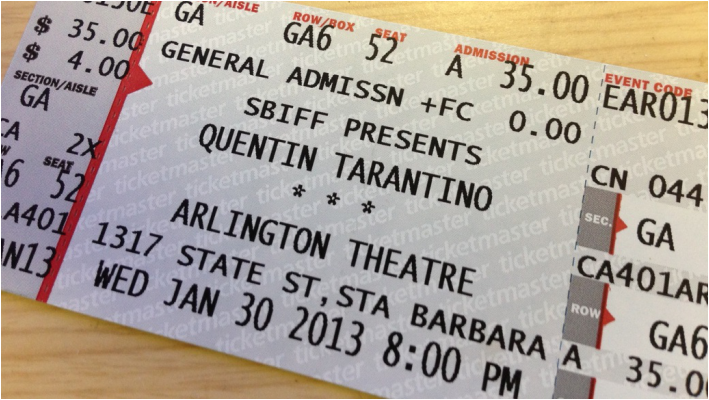Tarantino’s blend of informality and nervousness mirrors a paradox present in his films. Without fail, his movies entertain supremely, but they also carry an uneasy edginess. Fans herald this mixture as evidence of Tarantino’s innovative mastery, while critics lament its gratuity. If only Tarantino would lighten the violence, they say, he’d really be good. After hearing the director describe his creative process in detail, I think the answer may be somewhere in between.
To begin, Tarantino loves his work. On a lazy Sunday, when he sees his own films playing on Showtime or HBO, he has to watch them through to the end. “I saw Reservoir Dogs this afternoon,” Tarantino said. “A lot of people like to make movies for themselves. That’s great. But if you do, you’ve got to f-cking love your sh-t. I do.” It’s this self-obsession that allows Tarantino to trust his writing talent. When he was penning the scotch-sipping basement scene from Inglorious Basterds, he wrote 80 hand-written pages of dialogue, a scene twice the length of his best cinematic instincts. “Now all of a sudden they're in a 40-minute scene that's supposed to be suspenseful. It was never my intention for it to be that long…but I trust myself.”
Ignoring his inner-critic allows Tarantino to write with an episodic, stylistic flair largely unseen in cinema today. Unlike The Social Network’s efficiency or Argo’s deliberateness, Tarantino’s cinematic exploits relish in extended self-indulgence. With characters as spellbinding as Calvin Candie and Col. Hans Landa, why rush things along? Even if Hollywood suggests a tighter script, smoother plot and safer villain, Tarantino would simply rather make something he enjoys, industry be damned. He described how “good writers” (or even, after a pause, “decent writers with talent”) write for the page and the process, not for the end results. Tarantino doesn’t seal his script before he’s seen half his movie play out before him. It’s more satisfying, he reasons, to discover the end of a story as it begins to unfold.
Still, Tarantino’s confidence has its drawbacks. While the director’s captivating characters have an undeniable charm, they can be over-crafted and over-polished. Dr. King Schultz, the German bounty hunter from Django Unchained, enchants viewers with his whimsical mannerisms and eclectic vocabulary. It’s marvelous. It’s also entirely unbelievable. The director’s intricate—though often overwrought—scenes suffer from a similar ailment of excessive attention. Bursting with dialogue, fresh conflicts, and minor villains, every individual chapter becomes a short film in its own right. The technique pays off scene-by-scene, but sometimes at the cost of a larger reward. We tend to remember the director for all of the stylistic pieces, and less for the complete narrative. With Tarantino films, the sum of the parts may actually be greater than the whole.
Tarantino seems to know this, but he couldn’t write his movies any other way. Memorable characters and legendary scenes come about only with a bit of crazy disregard for standard protocol. Ordinary Hollywood sense would never have mixed with the sickly entrancing Col. Hans Landa or the mass movie-theater murder of the Third Reich.
After playing a clip from Reservoir Dogs, Horn asked Tarantino if he liked to engage in sub-textual criticism (the search for a film’s underlying meaning). “There are few things on the planet I love more than sub-textual criticism,” he said, “but that’s for other people to look at my work and do.” He did try it once on his own work, with Reservoir Dogs. Through the process--What does character X want more than anything in the world? Why?—he concluded that the movie was a father-son story, something that had never occurred to him during writing and filming. In the final moments of the film, Mr. White—suit bloodstained, sweat pouring down his forehead, gun hand shaking—has to choose between his metaphorical father (Joe, mob boss) and his son (Mr. Orange, fellow gangster and undercover cop). “Of course,” Tarantino said, “he makes the wrong choice, but for all the right reasons.” As he finished his exegesis, the audience applauded. It may very well have been the best sub-textual critique ever for the classic film.
“But I don’t want to tell a father-son story,” Tarantino said as he raised his lime-garnished goblet in protest. “I want to tell my gangster story.” Perhaps it’s a shame that Tarantino plays to these impulses, but without them, there wouldn’t be any films to complain about in the first place. And that would be the real shame.


 RSS Feed
RSS Feed
